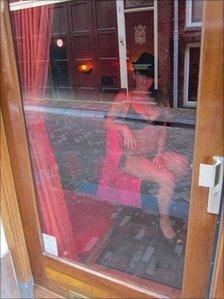Amsterdam's prostitutes targeted by Dutch tax officials
- Published

The Dutch government is looking at new ways to cut the country's budget deficit. It's hoping to tap in to an industry that generates billions of euros a year by bringing in a new plan to make prostitutes pay taxes like everyone else.
Officials have traditionally treated prostitutes with a little more leniency on taxation than other workers, seeing them as victims of pimps and people traffickers.
But the industry generates about 625m euros per year (£550m; $800m). And with thousands of potential added taxpayers, the authorities are now planning to pursue them for the average 33% tax that until now many have managed to avoid.
Spectacles section
Amsterdam's red-light district resembles something somewhere between a pornographic parade and amusement arcade.
Women from all over the world come here. Not all of them by choice. They peer out through windows under deliberately flattering red lights, striking a series of provocative poses designed to lure leering passers-by off the street.
The sex workers are separated into zones. There's a spectacles section where you can find girls who look like rather glamorous advertisements for bifocals.
For those gentlemen who prefer blondes there is a separate side street where you will find a large array of peroxide.

Three-quarters of Amsterdam's sex workers are foreign
Prostitution was legalised in Amsterdam in 2000 and sex workers are now classed as self-employed businesswomen.
In that time, the city has become synonymous with rowdy stag-parties and sex tourists. But a recent series of politically motivated changes have been aimed at cleaning up the red-light district and Amsterdam's international image in the process.
Most notable is Coalition Project 1012, named after the postcode for one of the city's downtown areas.
Selling sex is still the main source of income in the red-light district but the area has become a hugely popular tourist destination. And not just for boisterous hordes of partying men.
There are families here who wander around staring in at the real-life mannequins, with a mixture of curiosity and awe.
Foreign workers
Prostitution has flourished in Amsterdam since the 1600s, when the Netherlands was a global maritime power and its capital a significant port for the Dutch East India Company.
Nowadays, around three-quarters of the women who work in Amsterdam's sex industry are from Eastern Europe, Africa or Asia. Many of them fly in for a couple of months and fly out again, without anyone - other than their clients - ever knowing they are there.
Mariska used to have her own window in the red-light district and says many of the foreign sex workers are there simply to make as much money as possible and then leave.
"They don't register because they don't want people to know what they do and they don't want to pay tax."
She believes that if they have to pay the same tax rate as everyone else they should be treated the same too.
"It's hard to be a sex worker, not the job itself, but the way society is treating you. So it feels like a little bit of a double standard to pay tax to a society that doesn't accept you."
Form-filling
Nina is a petite Eastern European girl with long dark hair and an impressive pair of false eyelashes. She's self-employed and proud of the business she has built up. Before Nina started selling sex she made sure her window was registered.
"They make the rules so strict, if you want to work relaxed, you have to pay. When you come to work here they tell you: 'These are our rules.' I see the rules and I accept them. It's the same as if you work in a bar or a shop."

Officials now tour the area checking the proper forms are filled in
As part of the tax service's new tactics, officials are touring the red-light district, checking that the girls know that they are meant to be paying tax and making sure they've filled in all the proper forms. But Nina has some concerns.
"It's not that nice. They treat you like you're nothing. It's true, many girls don't pay tax because they have pimps and nobody really wants to pay but if you want to live in Holland you have to pay taxes."
If the scheme is to succeed, communication is crucial. For most of the women I met, Dutch was not their first language and few spoke English.
Hardly any appeared to have heard that tax rules were being enforced, so the tax inspectors' drop-in sessions will play an important part in helping the Dutch government receive its share of this lucrative trade.
For Nina, it is welcome news that those who have managed to avoid paying taxes will no longer be able to undercut the girls who have been playing by the rules.